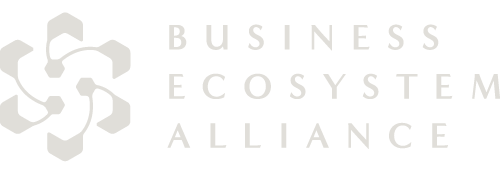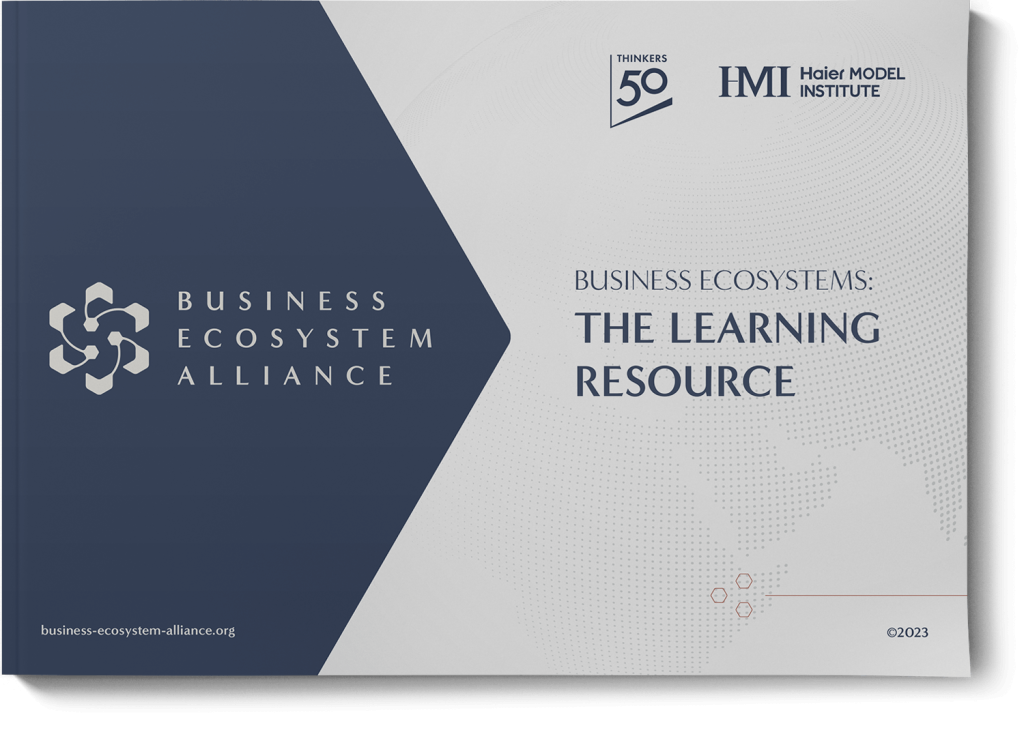About the awards
In 2020 the Business Ecosystem Alliance (BEA) launched the Zero Distance Awards. The awards identify and celebrate the work of organizations throughout the world in eliminating the distance between their employees, their operations and their customers. The BEA believes that ecosystems are a dynamic means of bridging the gap between organizations and their customers. Each year, BEA acknowledges the groundbreaking work of ten organizations in seeking to achieve Zero Distance.
About Zero Distance
The concept of Zero Distance was introduced by the Haier Group. It emphasises the connection between the business and the end-user or customer. This has become central to the management model of the Internet of Things era.
Following the success of the Zero Distance Awards, BEA is delighted to continue its partnership with HMI and the Management Lab to celebrate Zero Distance Excellence more broadly with the ZeroDX Awards, which will be announced for the first time in September 2024.
In 2015, Professor Dennis Campbell published “Zero Distance to Users” as a Harvard Business School case. He taught the case in the “High Performance Organization and Cultural Design” class. From the case, the principles of Zero Distance are clear:
Having a management philosophy that allows the organization to proactively react to newly identified user needs
An organizational design and processes that eliminate organizational barriers that separate employees from end users
The use of user-focused and independent teams that can move fast and smoothly within the organization
End-to-end accountability for the experience of end users is taken by the company and/or independent teams
The systematic collection, storage and use of end user data in order to increase value for end users
Commitment to the ecosystem principles of openness, equality, co-creation and co-sharing.
Winners 2023:

Amsterdam Tech (Netherlands)
The skills required for most jobs are evolving rapidly but our adult education and training systems are lagging behind. While 35% of the skills demanded for jobs across industries will change by 2030, at least 1 in 4 workers in OECD countries are already reporting a skills mismatch with the skills demanded by their current jobs. This skills gap lies behind the launch and development of Amsterdam Tech.
Amsterdam Tech is built on 30 years of track record in skills development connected with the vibrant ecosystem of innovation and technology of Amsterdam. Amsterdam Tech provides a robust learning experience far from a traditional classroom approach celebrating diverse learning preferences. Rather than being tied to a traditional classroom approach, Amsterdam Tech focuses on domain mastery, giving people the knowledge, they need in the workplace and advanced software skills; and leadership mastery, giving people the skills they need to work in teams and communicate effectively. Its degree programmes are built on six foundational elements: learning community, competency-based learning, flexibility, mentorship, action learning and a talent accelerator—as early as six months into the programme, students are connected to partner employers and recruiters in the Amsterdam area.
In daily practice there are many examples of Zero Distance at Amsterdam Tech. On Slack channels frontline staff can interact directly with students. The organization’s chat facility enables front-line staff to interact directly with candidates. Its student recruitment portal where frontline staff can engage directly with candidates and its learning portal enables students to engage directly with the faculty team.

Celestica (Canada)
Celestica is a Toronto-based technology design, manufacturing, and service company with 28,000 employees. It follows fundamental Zero Distance principles in a number of ways.
Its management philosophy allows the organization to proactively react to newly identified user needs. Every team has the autonomy to go out and track what they are seeing in the marketplace. It often acts as an incubator – teams will have an idea, take it out and try it with customers, and sometimes fail fast and try again. Part of the company’s strategy is working with early stage companies that are not fully mature. When it identifies an end user need, it looks for leading edge companies which are meeting that need.
Celestica maintains a small executive leadership team of seven people. This helps it keep to a simple process that eliminates barriers. Continuous feedback between the business, operations, finance, and strategy is very direct. If the company is setting up a new business line, the strategy team can go out and talk to customers directly. End-to-end accountability for the experience of end users is taken by the company and/or independent teams. Each customer has a “CEO of their account” who acts as a single point of contact and has full autonomy to do what they need to do to solve the customer’s problem. Celestica also practices customer score carding. It receives feedback on strategic alignment to systematically collect data to make sure it works. The market intelligence function sits within the strategy department and provides data for key decision makers.

Province of South Holland (Netherlands)
With 3.8 million inhabitants, South Holland is the most populated province in the Netherlands. The Province, being responsible for the design and maintenance of the physical living environment, has been operating in a multi-stakeholder area for years, and complexity is growing.
This year it changed from a hierarchical to a social issues-based structure to act proactively on those issues that need to be tackled in collaboration with others. With the need for better insight into the ecosystem, it developed the open platform DeSNapp, De Strategic Network app. This platform enables the Province to build data intelligence about collaborations, networks and ecosystems, while at the same time making groups and collaborations visible as sources of knowledge and experience.
The focus of the platform is on the entity ‘group’. Groups are invited to communicate, so everyone knows what’s happening. By allowing every organization to be active on the platform, all groups that play some role in the ecosystem become visible. Groups have agency and produce ideas, knowledge and information that are of interest to others. They are the building blocks of the ecosystem.
The focus on groups and then enabling group communication is supported by the design principle of openness. Organizations active on the platform will have access to a dashboard that gives them direct insight into the totality of all their collaborations, plus an overview of all the group-based activities within the organization. This is valuable information, hard to obtain otherwise and reinforces the message that the group is part of a community of organizations.

Teladoc Health (US)
Based in Purchase, New York, with 5,000 employees, Teladoc Health was founded on a simple, yet revolutionary idea: everyone should have access to the best healthcare anywhere in the world on their terms. Twenty years later, it is a world leader in whole-person virtual care. At the heart of this is a Zero Distance approach to data and AI.
Giving end users access to data, Teladoc Health built a unified set of data solutions and services that have three foundational onramps—raw data for exploration, partially conformed data for structured reasoning and integration data for population level insight. Its Unified Data Fabric connects the dots between all three and ensures that data is always cohesive and consistent no matter how accessed. Teladoc Health goes beyond removing the end user’s barriers to accessing historical data, the company provides near real-time data ingestion and integration with self-service tools to access the latest data on demand. The very nature of a data steward model focused on data lifecycle and value is fundamentally aligned with principles of openness, equality, co-creation and co-sharing.
Additionally, in June 2023, the data and analytics team launched an AI seminar series that helps educate and inspire every individual in the company in the new art of the possible, on the frontier of analytical science. After each seminar, which is often led by external experts from academia and industry, the team published an externally shared article that highlights the key findings and encourages open discussion of the field of AI.

Unbossers (Belgium)
“We believe a healthy corporate culture is not only crucial for business. It plays a key role in advancing society,” says Nick Van Langendonck, founder of the Belgium-based organization Unbossers. The company feels that corporate culture is shaped by the behaviour of every employee. Each time we interact with others, each of us actively shapes the company culture we ultimately experience.
To change the role of a manager, to decentralize power to frontline teams, to involve customers and partners in the strategic process or to share profits are its logical outcomes, but not the primary objective of unbossing. Unbossers invites anyone, regardless of their position, to adopt six behaviours which they believe foster a culture in which people are valued and long-term financial health is ensured: Do we strive to do good in every interaction? Do we attempt to take responsibility in every interaction, even for the mistakes of others? Do we try to remain humble in every interaction because we understand it's not about us but about serving the customer? Do we aim to be open and inclusive in every interaction? Do we make an effort to help others in every interaction? Do we try to keep calm and promote peace in every interaction?
The board of the Unbossers Network Foundation consists of customers, partners, and experts. The directors rotate every two years and make decisions without any financial interests in the company. Unbossers also receives funding from investors who have a profit share arrangement, providing capital in exchange for a fixed return, but with no influence in the organization's policies. Profits are reinvested in the Unbossers Network, enabling its participants to accelerate progress. This is legally safeguarded and monitored by an independent party.

WeUsThem (Canada)
WeUsThem is a full service advertisement agency based in Halifax, Canada. The emphasis at WeUsThem is on creating and nurturing a diverse team with project teams composed of individuals from diverse departments, ensuring that a broad range of perspectives informs all of its products and services. This enriches the creative process, resulting in products and services that resonate more deeply with end users. Its clients have customers in over 142 countries. Diversity and a commitment to customers also spawns business ideas. WeUsThem has recently spun off the digital healthcare company, HealthEMe, which already has 13 employees. This is part of the agency’s commitment to staying at the forefront of innovation and connected to various audiences so that it can anticipate and fulfill user needs before they even fully articulate them. This is perhaps why HealthEMe is already in six countries and expanding to more shortly with its imTEEN product.
Employing the principle of Zero Distance HealthEMe emphasizes seamless communication. It has built in a robust secure and privacy communication system that enables patients to interact with their healthcare providers and carers directly from the platform at any time. This eliminates geographical barriers, making healthcare accessible and immediate. Patients can seek advice, clarification, or simply share their concerns without the need for physical appointments, ensuring timely and responsive care. From chronic illnesses to holistic health management pre, during and post a clinical intervention, the IP developed supports the patient and their circle of care while staying connected to emergency services and their care providers should they have one.
See winners from past years
What does it mean to win a Zero Distance Award?
“For us, Zero Distance means having no barriers for front-line staff to interact directly with our clients and being able to respond as they wish without needing any approval. We certainly plan to continue to ensure there are no organisational barriers that separate our people from our clients.”
“It’s a great moment for Jaipur Rugs to win the Zero Distance Award and a testimony to our philosophy of connecting the weavers directly with the end consumers. I feel more confident than ever that our vision of democratizing the carpet value chain, by eliminating the middlemen to empower both the weavers and the end consumers, has been recognized by the Business Ecosystem Alliance.”
“Winning the Zero Distance Award means that our transformation is working. It was only four years ago when we read for the first time about RDHY and its Zero Distance principle. In 2020, we confirmed the power of Zero Distance as a business driver that’s enabling our very successful performance. We have taken the Zero Distance concept to a totally new level, applying it to every single angle of our work.”
“Winning the Zero Distance Award is a source of great pride. External recognition is always a boost for confidence and a sign that our organization is moving in the right direction. We have been pushing for a customer-obsessed mindset in our organization. Zero Distance means that we are putting the customer at the heart of our organization and that we are more agile and more responsive to the customer’s requests and needs.”
“Government needs to improve the way it engages with citizens, taking the lead from business best practice. Ideas such as Zero Distance from customers, organizational agility and the lean start-up movement all have lessons for government. Taken to its logical conclusion this might even mean that every citizen has their own account manager – even if that account manager is an algorithm or AI-inspired bot or avatar.”


